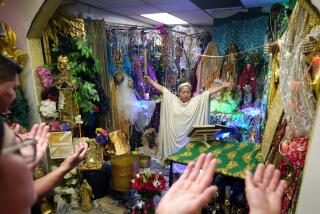Fighters With Amulets, Machetes : Cult Wages Holy War on Philippines’ Communists
- Share via
CEBU, Philippines — At high noon Thursday, the 13 devotees of the Sagrado Corazon Senor religious cult fell to their knees in the detention area of a military camp here and prayed for strength to resume their holy war against communism.
For 15 minutes, they mumbled sacred incantations, fingered amulets that they believe make their bodies bulletproof and invoked the power of their master, a bearded Filipino religious zealot who claims to be a reincarnation of Jesus. They repeat this ritual five times daily in the belief that it will lead them to victory in their violent fight against Philippine Communist insurgents.
On Thursday, the Sagrado devotees were praying all the harder. Their local leader said it was nothing less than a matter of survival for the bizarre, militant cult, which claims 2,000 members on Cebu Island alone and as many as 150,000 throughout the Philippines.
On Tuesday, the 13 cultists had shot, hacked and nearly killed two government militiamen, allegedly after they mistook them for Communist rebels on the outskirts of the city. And that shoot-out has focused unprecedented attention on what must rank among the Philippine armed forces’ most controversial instruments in its anti-communism crusade.
The religious cult, a Philippines-based Christian offshoot whose members claim to believe that they are invincible “soldiers of Christ,” is among many right-wing vigilante groups that have apparently been given official sanction by the armed forces to help fight the country’s 18-year armed Communist insurgency.
Although fiercely independent and secretive, the cult has joined forces with several other right-wing, anti-Communist organizations in the remote rural regions of at least four key Philippine provinces, where the government military has had limited success in combatting the growing rebellion.
Fighting with homemade machetes, spears, darts, slingshots, rocks and sometimes firearms supplied by the armed forces, the Sagrado Corazon Senor (Sacred Heart of the Lord), according to cult leaders and local military commanders, has driven Communist rebels out of many villages where the government and army of President Corazon Aquino has had little or no influence.
Aquino herself has given conflicting signals about whether she endorses the rightist vigilante groups. Two weeks ago, she ordered them disbanded. But the next day, in the face of criticism from senior military commanders and several of her political advisers, Aquino amended the order, requesting only that an official study be made of the groups’ activities.
Aquino’s armed forces chief of staff, Gen. Fidel V. Ramos, and her secretary of local governments, Jaime Ferrer, have both endorsed the use of citizen vigilante groups, armed only with traditional weapons such as knives and spears, as an adjunct to the military’s current campaign against the rebels.
Fears of Death Squads
Roman Catholic Church leaders, academics and leftist politicians have voiced fears that the vigilantes could become death squads similar to those accused of killing civilians in some Latin American countries.
The most controversial, by far, have been Sagrado Corazon Senor’s “soldiers of Christ.”
The sect is also known here by the name Tadtad, meaning “chop chop” in the local dialect and referring to the cult’s initiation rites and to the treatment it gives its enemies.
Before a devotee is inducted, Sagrado’s leaders say, a priest tests his faith by chopping the inductee’s arms and wrists with a machete. If his faith is strong, it is said, the devotee’s limbs will not be severed; the blade barely leaves a scratch. However, in several villages of Cebu, the cult’s leaders concede, there are amputees of lesser faith.
As for the way they treat their enemies, military authorities in Cebu and on the southern Philippine island of Mindanao, where the sect is strongest, have reported finding several severed heads of suspected Communist rebels in recent weeks.
Father Ramon Fruto, a Catholic priest who is controversial here for his criticism of right-wing vigilantes, said, “There is apprehension that these religious cults can be used, and they are being used, as agents of the military who are not accountable to anyone.”
Shoot-Out a ‘Misencounter’
Few of the encounters involving the Sagrado Corazon Senor cult in recent months better illustrate that lack of accountability, and its potential for future chaos, than Tuesday’s shoot-out in Cebu.
Military authorities call Tuesday’s incident a “misencounter,” in which they say the cultists and two plainclothes militiamen mistook each other for Communist rebels.
The militiamen and the cultists both opened fire. The cultists then moved in and began chopping away at the government men, leaving them critically wounded. They realized their mistake hours later after taking refuge in a nearby military camp.
“The incident is under investigation, and we are treating it as a serious matter,” Col. Anselmo Avenido, the police commander of the city of Cebu, said. “As of now, though, it appears it was something of a misunderstanding.”
Avenido conceded that the cult has been “a great help” in his campaign to rid the country’s second-largest city of Communist rebels. But he insisted that that fact will not affect the investigation.
13 Devotees Detained
None of the 13 devotees has been formally charged, he added, but all are detained at his military camp pending the outcome of the investigation.
“This group is anti-Communist, basically,” Avenido said. “And we are fighting communism. When we go to some places, especially the mountain areas, the first people who approach us and offer their help are members of this group. . . .
“But I do not look at them as fanatics. I look at them as ordinary citizens. And if they violate the law, we will arrest them.”
The group’s belief that their rituals make them invincible to bullets dates back to the 1970s, when the now-deposed President Ferdinand E. Marcos was in power. At that time, the sect’s master, who calls himself Sagrado Corazon Senor, established his “kingdom” in a northern province of Mindanao.
Claiming to be Jesus returned to Earth, the master told his early followers that his mission was to create an “army of light” to defeat the forces of Satan. As his devotees grew in number, reports of massacres and murders of Communist insurgents and Muslim secessionist rebels were increasingly attributed to the cult.
Under Marcos, several military commanders now concede, the cult was used by the government as little more than a death squad. In the face of public pressure, the armed forces severed their ties to the group.
Anti-Communist Mission
But now, the military insists it can better control the sect. And Leon Kilat, the cult’s leader in Cebu, said in an interview Thursday that his sole mission now is to help rid the nation of Communists, and he added the belief that President Aquino shares this mission.
“We are also Catholics, but we were chosen by the Lord as the soldiers of Christ,” Kilat said in explaining how his sect differs from mainstream Catholicism, the religion of 85% of Filipinos.
“But we are not like ordinary worshipers because our incantations are all in Latin and all of them are focused on war,” he said. “We are the warriors of God.
“There are only two soldiers in the world--the soldiers of Christ and the soldiers of the devil. We fight the Communists because the Communists are godless and because they are trying to grab power. They are certainly the soldiers of Satan.”
Kilat, who interrupted the interview at noon to kneel toward the sun and recite 15 minutes of prayers, said his group believes that their prayers and the amulets they wear around their necks, arms, wrists and waist make them invincible.
Amulets Field Tested
“These amulets have been tested in the field of battle,” he said. “If our faith is strong, and we recite our prayers as we go into battle, the bullets cannot penetrate our bodies.”
Kilat’s predecessor, Feliciano Lingawingaw, was killed last year when he was attacked by 15 Communist rebels. But Kilat insisted that dozens of bullets bounced off Lingawingaw before the rebels overpowered him, removed his amulets and killed him.
Kilat quickly added that, if the faith of a devotee is weak or if he has violated the cult’s strict bans on drinking alcohol, smoking, gambling and stealing, he can be injured or killed.
“It is God who passes judgment,” Kilat said.
Such provisos, he said, help explain how two cult members suffered gunshot wounds in the “misencounter” with the two government militiamen Tuesday. “If their faith had been even weaker,” Kilat added, “those devotees would have been killed.”
Practice Self-Defense
As for its anti-Communist crusade, Kilat asserted that his cult primarily practices self-defense.
“We only kill the Communists because if we do not, they will try to kill us,” he said, adding that since he took over the Cebu group nine months ago, the rebels have killed seven of his men. In retaliation, he added, the cult has killed 15 rebels.
That self-proclaimed defensive posture is cited by leaders of Cebu City’s growing anti-Communist movement in justifying the cult’s membership in a new right-wing umbrella group called the National Movement for Freedom and Democracy.
“We welcome them because they are largely a defensive-oriented group,” Jun Alcover, the movement’s national president, said. “But we are very aware of the controversy surrounding them. By bringing them into our movement, which does not advocate using armed citizens’ groups to fight communism, we hope to make them less antagonistic to the people.”
More to Read
Sign up for Essential California
The most important California stories and recommendations in your inbox every morning.
You may occasionally receive promotional content from the Los Angeles Times.













